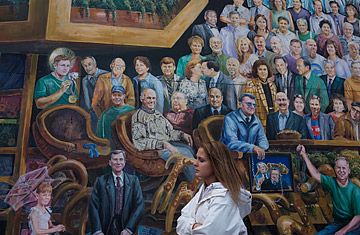
Accused child molester Jerry Sandusky's image was removed, far left, from a mural of Penn State greats. The blue ribbon is a symbol of support for victims of child abuse.
(2 of 3)
With his philanthropy came great power. According to a recent Wall Street Journal report, Paterno thwarted the efforts of Vicky Triponey, the school's former standards-and-conduct officer, to discipline football players for, among other transgressions, beating up other students. Paterno even threatened to stop fundraising if she was not fired. Triponey resigned in 2007. "It's no secret that Penn State football acted unfettered," says Donald Heller, an education professor at Penn State, "and without institutional control."
Matt Paknis, like Paterno an alumni of Brown University, was a graduate assistant coach for Penn State in the late 1980s. "I always scratched my head about that place," says Paknis, now a leadership-development consultant living in Massachusetts. "You had to fit into the approval system that was out there. There wasn't a lot of challenging, saying, 'What's going on here?'"
Paknis, maybe because of his low status, was never welcomed into the inner circle, he says. "There was this projection outside of Penn State that he was the dean, this nice old guy," he says of Paterno. "That's the furthest thing from the truth. He ruled with an iron fist." In that environment, Paknis believes, Penn State would be loath to look too closely at the accusations swirling around former assistant coach Jerry Sandusky, for fear of damaging the brand. But other Penn State veterans strongly dispute that self-protection played a role. "There was never a reluctance for Joe to involve people in deep thinking, to tap into creative minds," says Craig Cirbus, an assistant coach for Paterno from 1984 to '94 who became head coach at the University at Buffalo. "He wanted all different views provided." And Paterno's defenders have argued all along that had he and other coaches and administrators understood the extent of Sandusky's alleged crimes, they would have intervened more aggressively. So what is it they weren't able to see?
The Psychology of Protection
Within a college bubble, say organizational psychologists, the urge to shape your mental picture of the world can be overwhelming. "Culture trumps everything," says Laura Finfer, a psychologist and a principal at a New York City executive consulting firm. Colleges, Finfer has found, can be quite clannish: "Cultures define you, and you become blind to everything in front of your eyes."
Or the way you see things changes. Ray Aldag, a management professor at the University of Wisconsin's School of Business, points to two cognitive tricks: selective perception and subjective perception. Selective perception is our bias toward ignoring information that is at odds with our worldview. Subjective perception explains our tendency to couple uncomfortable information with reaffirming facts in order to make ourselves feel better. For example, Penn Staters decry abuse. But pair that with anger over the indignity of Paterno's dismissal, and Paterno becomes a victim.
Cohesive groups like the Penn State football leadership tend to draw boundaries around themselves. "We apply rules of fair and just behavior to our own groups and people within them," says Michelle Duffy, an organizational-behavior professor at the University of Minnesota's Carlson School of Management. "But we morally exclude outsiders. In some ways you are dehumanizing out-group members--in this case, the victims."
